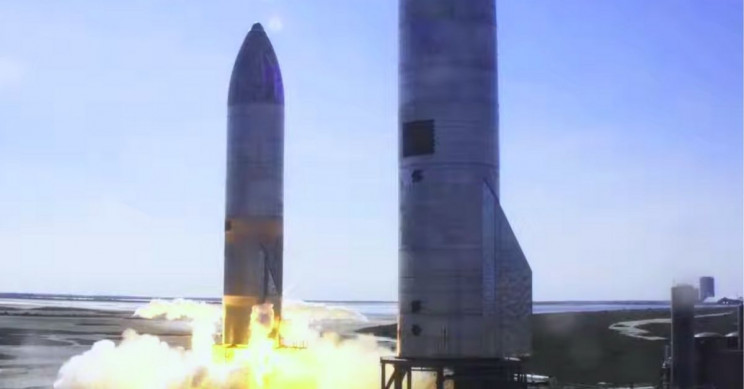After delays and a flap with the FAA, the Mars rocket prototype ran a vertical 10K on Tuesday.
The second flight of a prototype of Elon Musk's next-generation Starship rocket, meant for eventual trips to Mars, was picture-perfect right up until the landing, which like the test of an earlier prototype, ended in a fiery explosion on Tuesday.
After several delays and a dust-up with the Federal Aviation Administration over its launch license, SpaceX launched the vehicle dubbed SN9 from its Boca Chica, Texas, facility at around 12:30 p.m. PT.
The three-engine rocket flew to an altitude of 6.2 miles (10 kilometers), shutting off its three engines in sequence as it climbed higher. It then began a long fall back to Earth, as its predecessor SN8 did during a test flight in December.
As it came in for a landing, SN9 executed a landing burn to orient itself vertically for touchdown, then appeared to land hard and not quite vertical, exploding on impact just as SN8 did.
The FAA announced after the flight that the agency will open and oversee an investigation into SN9's "landing mishap."
"Although this was an uncrewed test flight, the investigation will identify the root cause of today's mishap and possible opportunities to further enhance safety as the program develops," an FAA spokesperson said in a statement.
SpaceX still considers the test a success and will continue to gather data for future test flights that will eventually take the prototypes to orbit.
"We've just gotta work on that landing," SpaceX's John Insprucker said during the livestream of the flight.
It became clear early Tuesday morning this might finally be the day for SN9's maiden (and only) flight, when the FAA said in an emailed statement it had approved the launch license for SN9, while also revealing the December launch of SN8 was done without the full sanctioning of the agency.
The revelation helps explain the weeks of delays before the launch of SN9. Last week, SpaceX and Musk engaged in a staring contest with the FAA, and the FAA didn't blink.
On Thursday, SpaceX went through the process of loading fuel into SN9 in preparation for a launch at its Texas Gulf Coast facility. But the FAA didn't give its approval for the flight to take place.
Musk aired his frustration with the government agency on Twitter:
Unlike its aircraft division, which is fine, the FAA space division has a fundamentally broken regulatory structure.
— Elon Musk (@elonmusk) January 28, 2021
Their rules are meant for a handful of expendable launches per year from a few government facilities. Under those rules, humanity will never get to Mars.
"Unlike its aircraft division, which is fine, the FAA space division has a fundamentally broken regulatory structure. Their rules are meant for a handful of expendable launches per year from a few government facilities. Under those rules, humanity will never get to Mars."
In response to a request for comment, an FAA spokesperson said: "We will continue working with SpaceX to resolve outstanding safety issues before we approve the next test flight."
Latest Stories
-
Syria’s minorities seek security as country charts new future
21 minutes -
Prof. Nana Aba Appiah Amfo re-appointed as Vice-Chancellor of the University of Ghana
28 minutes -
German police probe market attack security and warnings
29 minutes -
Grief and anger in Magdeburg after Christmas market attack
30 minutes -
Baltasar Coin becomes first Ghanaian meme coin to hit DEX Screener at $100K market cap
1 hour -
EC blames re-collation of disputed results on widespread lawlessness by party supporters
2 hours -
Top 20 Ghanaian songs released in 2024
2 hours -
Beating Messi’s Inter Miami to MLS Cup feels amazing – Joseph Paintsil
2 hours -
NDC administration will reverse all ‘last-minute’ gov’t employee promotions – Asiedu Nketiah
2 hours -
Kudus sights ‘authority and kingship’ for elephant stool celebration
2 hours -
We’ll embrace cutting-edge technologies to address emerging healthcare needs – Prof. Antwi-Kusi
3 hours -
Nana Aba Anamoah, Cwesi Oteng special guests for Philip Nai and Friends’ charity event
3 hours -
Environmental protection officers receive training on how to tackle climate change
3 hours -
CLOGSAG vows to resist partisan appointments in Civil, Local Government Service
4 hours -
Peasant Farmers Association welcomes Mahama’s move to rename Agric Ministry
4 hours

